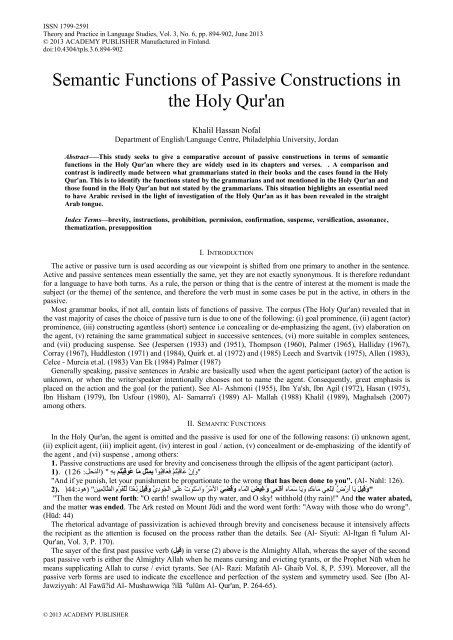Theory and Practice in Language Studies Contents - Academy ...
Theory and Practice in Language Studies Contents - Academy ...
Theory and Practice in Language Studies Contents - Academy ...
Create successful ePaper yourself
Turn your PDF publications into a flip-book with our unique Google optimized e-Paper software.
ISSN 1799-2591<strong>Theory</strong> <strong>and</strong> <strong>Practice</strong> <strong>in</strong> <strong>Language</strong> <strong>Studies</strong>, Vol. 3, No. 6, pp. 894-902, June 2013© 2013 ACADEMY PUBLISHER Manufactured <strong>in</strong> F<strong>in</strong>l<strong>and</strong>.doi:10.4304/tpls.3.6.894-902Semantic Functions of Passive Constructions <strong>in</strong>the Holy Qur'anKhalil Hassan NofalDepartment of English/<strong>Language</strong> Centre, Philadelphia University, JordanAbstract—This study seeks to give a comparative account of passive constructions <strong>in</strong> terms of semanticfunctions <strong>in</strong> the Holy Qur'an where they are widely used <strong>in</strong> its chapters <strong>and</strong> verses. . A comparison <strong>and</strong>contrast is <strong>in</strong>directly made between what grammarians stated <strong>in</strong> their books <strong>and</strong> the cases found <strong>in</strong> the HolyQur'an. This is to identify the functions stated by the grammarians <strong>and</strong> not mentioned <strong>in</strong> the Holy Qur'an <strong>and</strong>those found <strong>in</strong> the Holy Qur'an but not stated by the grammarians. This situation highlights an essential needto have Arabic revised <strong>in</strong> the light of <strong>in</strong>vestigation of the Holy Qur'an as it has been revealed <strong>in</strong> the straightArab tongue.Index Terms—brevity, <strong>in</strong>structions, prohibition, permission, confirmation, suspense, versification, assonance,thematization, presuppositionI. INTRODUCTIONThe active or passive turn is used accord<strong>in</strong>g as our viewpo<strong>in</strong>t is shifted from one primary to another <strong>in</strong> the sentence.Active <strong>and</strong> passive sentences mean essentially the same, yet they are not exactly synonymous. It is therefore redundantfor a language to have both turns. As a rule, the person or th<strong>in</strong>g that is the centre of <strong>in</strong>terest at the moment is made thesubject (or the theme) of the sentence, <strong>and</strong> therefore the verb must <strong>in</strong> some cases be put <strong>in</strong> the active, <strong>in</strong> others <strong>in</strong> thepassive.Most grammar books, if not all, conta<strong>in</strong> lists of functions of passive. The corpus (The Holy Qur'an) revealed that <strong>in</strong>the vast majority of cases the choice of passive turn is due to one of the follow<strong>in</strong>g: (i) goal prom<strong>in</strong>ence, (ii) agent (actor)prom<strong>in</strong>ence, (iii) construct<strong>in</strong>g agentless (short) sentence i.e conceal<strong>in</strong>g or de-emphasiz<strong>in</strong>g the agent, (iv) elaboration onthe agent, (v) reta<strong>in</strong><strong>in</strong>g the same grammatical subject <strong>in</strong> successive sentences, (vi) more suitable <strong>in</strong> complex sentences,<strong>and</strong> (vii) produc<strong>in</strong>g suspense. See (Jespersen (1933) <strong>and</strong> (1951), Thompson (1960), Palmer (1965), Halliday (1967),Corray (1967), Huddleston (1971) <strong>and</strong> (1984), Quirk et. al (1972) <strong>and</strong> (1985) Leech <strong>and</strong> Svartvik (1975), Allen (1983),Celce - Murcia et.al. (1983) Van Ek (1984) Palmer (1987)Generally speak<strong>in</strong>g, passive sentences <strong>in</strong> Arabic are basically used when the agent participant (actor) of the action isunknown, or when the writer/speaker <strong>in</strong>tentionally chooses not to name the agent. Consequently, great emphasis isplaced on the action <strong>and</strong> the goal (or the patient). See Al- Ashmoni (1955), Ibn Ya'sh, Ibn Agil (1972), Hasan (1975),Ibn Hisham (1979), Ibn Usfour (1980), Al- Samarra'i (1989) Al- Mallah (1988) Khalil (1989), Maghalseh (2007)among others.II. SEMANTIC FUNCTIONSIn the Holy Qur'an, the agent is omitted <strong>and</strong> the passive is used for one of the follow<strong>in</strong>g reasons: (i) unknown agent,(ii) explicit agent, (iii) implicit agent, (iv) <strong>in</strong>terest <strong>in</strong> goal / action, (v) concealment or de-emphasiz<strong>in</strong>g of the identify ofthe agent , <strong>and</strong> (vi) suspense , among others:1. Passive constructions are used for brevity <strong>and</strong> conciseness through the ellipsis of the agent participant (actor)." ثِِٗ " 626 1)."And if ye punish, let your punishment be propartionate to the wrong that has been done to you". (Al- Nahl: 126)."َّقٍِلَ ٠َب أَسْضُ اثٍَْعِٟ َِبءَنِ ٠ََٚب عََّبء أَلٍِْعِٟ َّغٍِضَ اٌَّْبء َّقُضًَِ األَِْشُ َٚاعْزََٛدْ عٍََٝ اٌْدُٛدِِٞ َّقٍِلَ ثُعْذًا ٌٍِْمََِْٛ اٌّظَب١ٌِِّٓ" )٘ٛد:44)َ .(2"Then the word went forth: "O earth! swallow up thy water, <strong>and</strong> O sky! withhold (thy ra<strong>in</strong>)!" And the water abated,<strong>and</strong> the matter was ended. The Ark rested on Mount Jūdi <strong>and</strong> the word went forth: "Away with those who do wrong".(Hūd: 44)The rhetorical advantage of passivization is achieved through brevity <strong>and</strong> conciseness because it <strong>in</strong>tensively affectsthe recipient as the attention is focused on the process rather than the details. See (Al- Siyuti: Al-Itgan fi ulum؟ Al-Qur'an, Vol. 3, P. 170).َٚاِْ عَبلَجْزُُْ فَعَبلِجُٛاْ ثِوِثْلِ هَب عُْقِجْزُن )إٌحً: )The sayer of the first past passive verb ) ) <strong>in</strong> verse (2) above is the Almighty Allah, whereas the sayer of the secondpast passive verb is either the Almighty Allah when he means curs<strong>in</strong>g <strong>and</strong> evict<strong>in</strong>g tyrants, or the Prophet Nūħ when hemeans supplicat<strong>in</strong>g Allah to curse / evict tyrants. See (Al- Razi: Mafatih Al- Ghaib Vol. 8, P. 539). Moreover, all thepassive verb forms are used to <strong>in</strong>dicate the excellence <strong>and</strong> perfection of the system <strong>and</strong> symmetry used. See (Ibn Al-Jawziyyah: Al Fawā?id Al- Mushawwiqa ?ilā ulūm؟ Al- Qur'an, P. 264-65).قٍل© 2013 ACADEMY PUBLISHER
















